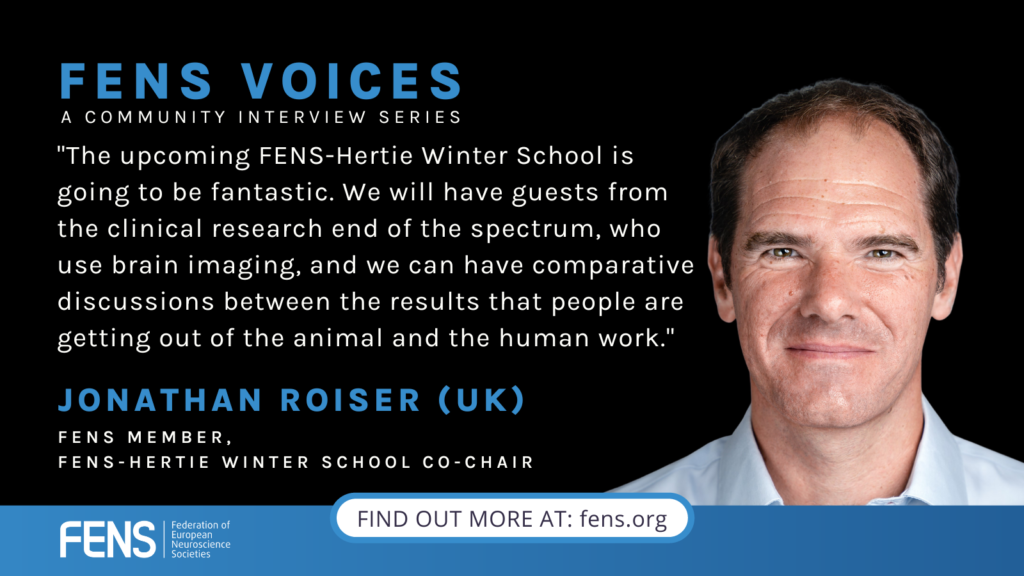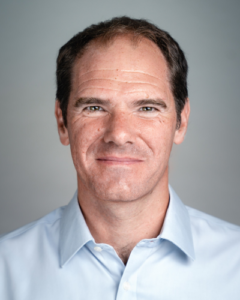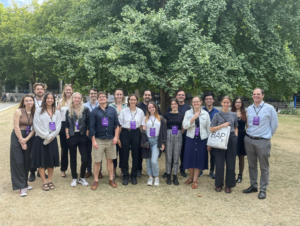
FENS Voices | Jonathan Roiser: Broadening horizons
23 June 2023
FENS News, Neuroscience News, Society & Partner News
FENS had the pleasure of talking to Dr Jonathan Roiser, the co-chair of the FENS-Hertie Winter School on “Neuroscience of Mental Health”, alongside Patrizia Campolongo (IT) and Carmen Sandi (CH), about this high-level event taking place in Obergurgl, Austria, from 3-9 December 2023. Dr Roiser is Professor of Neuroscience and Mental Health and Deputy Director at the UCL Institute of Cognitive Neuroscience. His research interests lie in understanding the brain and psychological processes driving mental health problems, especially disrupted motivation in depression. He has published over 150 peer-reviewed papers and his recent research has been funded by Wellcome, the Leverhulme Trust and the Rosetrees Trust. Read the full interview below.
What should the participants expect from the FENS-Hertie Winter School, “Neuroscience of Mental Health”?

JR: The upcoming FENS-Hertie Winter School is going to be fantastic, thanks to the combination of clinical and pre-clinical content, which you don’t often get. We will have guests from the clinical research end of the spectrum, who use brain imaging, and we can have comparative discussions between the results that people are getting out of the animal and the human work. Then, there are going to be people who are coming from a perspective where they’re looking at the impact of inflammation, which I find really interesting.
I think that the key selling point is having all of these different scientists in the same place and we are asking the faculty to stay for as long as possible during the entire Winter School so that we can have important discussions outside the context of the talks as well.
Most importantly, participants will have the chance to network with researchers outside their immediate field, whether during meals, drinks or while sitting on the ski lift, in this interdisciplinary event.
Why are the FENS-Hertie Winter Schools important for students and early career researchers?
JR: I think that these Winter Schools offer a very intimate environment. These are small, with around 40 early career researchers and maybe about 15 faculty. So you’re going to have the opportunity to talk to everybody. The location is a beautiful residential retreat, in the mountains, and everyone is stuck there. Participants can’t go off and do other things on their own, so you have no choice other than to interact. This means that there’s a strong social element, which is very important.
Science is a social enterprise and being able to make connections and follow up with people afterward is very useful for early career researchers. They have the chance to meet the top people in their field.
Then, from an intellectual/conceptual perspective, most people who do human neuroscience work in mental health do not have a massive amount of interaction with people who are doing for example animal research or computational research, and vice versa. I think that FENS offers a real opportunity to broaden horizons during these kinds of events. For sure I know that I’m going to learn an enormous amount and everyone will get some real insights that you wouldn’t otherwise by coming to one of these schools.
What are the biggest hurdles for junior career neuroscientists?
JR: First of all, there is this inevitability that some people have to leave, due to the number of faculty positions available. Not everybody who does a PhD or even a postdoc can go on to become faculty. Honestly, the landscape is much more attractive nowadays than it was when I finished my PhD, especially as there are more opportunities in tech. Mental health became a huge area of growth in the tech field over the last five years. If I were graduating now, I’m sure that would be a very attractive proposition for me as well.
Unfortunately, in recent years it has become much more common to have people teaching in universities who are on short-term contracts with no sort of promise of a permanent position. This needs to change. Research culture and the way we evaluate scientists is also a big deal, but I think it is slowly starting to improve. The level of the journal that you are publishing matters, but I think it’s important that we move away from that because you cannot judge the quality of an individual paper based on the journal. From a mathematical perspective, it doesn’t make any sense to think about the quality of journals in that way, because of the distribution of the citations, which is highly skewed.
As you are talking about publishing, the European Journal of Neuroscience (EJN), the FENS journal, has a transparent peer review system. What are the benefits of publishing in society journals? Why should researchers in the early-stages of their careers publish with EJN?
JR: I’m in favour of transparent review processes. There are a few minuses, but overall it’s a big plus. My major complaint about academic publishing is the amount of scientific work that is lost in the process. It’s important because there is a lot of intellectual content that would otherwise never see the light of day. And so people sort of pretend that their paper is the finished product, but in reality it’s gone through this discussion and transformation process with the reviewers and the editors. There’s a huge place for review. I think it’s very important that we have qualified peers evaluating our work, and having the reviews in the open is also very important.
I think the general movement towards transparency, and obviously FENS is part of that, is definitely a positive thing. And I very much value that openness, especially openness in the reviewer comments over having the traditional closed system. And I think we are going to see a lot more journals move in that direction in the coming years.
In 2008 you founded the UCL-NIMH Joint Doctoral Training Programme in Neuroscience, which you currently co-direct. In 2020 you founded the UCL Wellcome 4-year PhD in Mental Health Science. What drives you to support early career scientists and training programmes?
 JR: I find early career researchers really interesting to talk to because very often, certainly in neuroscience, there is an amalgam of lots of different fields. You can’t study the brain just from one perspective and there are constant developments in all of the different fields that comprise neuroscience. So, when you have a new student or a new postdoc coming in, they’re very often bringing a totally different perspective to a topic. I always find talking to early career researchers inherently interesting. I do genuinely find the mentoring and the support of early career research extremely important, interesting and fun, but it also protects me from other administrative responsibilities.
JR: I find early career researchers really interesting to talk to because very often, certainly in neuroscience, there is an amalgam of lots of different fields. You can’t study the brain just from one perspective and there are constant developments in all of the different fields that comprise neuroscience. So, when you have a new student or a new postdoc coming in, they’re very often bringing a totally different perspective to a topic. I always find talking to early career researchers inherently interesting. I do genuinely find the mentoring and the support of early career research extremely important, interesting and fun, but it also protects me from other administrative responsibilities.
You get to hear about new ideas all the time. For the Wellcome scheme, when we set up the programme, we had no idea what the students we were attracting were going to do because our approach is very broad, much broader than just neuroscience. We’ve got a lot of epidemiology and intervention research in there as well.
Speaking of beginnings, we would like to learn more about your “origin story”. What piqued your interest in science?
JR: When I was a kid, I was always good at science, and I did well in science assignments. When I became a teenager, I was most interested in biology and chemistry, and I thought I was going to be a biochemist. My mother was quite the opposite, she was what you might call “a hippie”. She was a bit sceptical of biology, especially genetic engineering. So I decided that I would become a genetic engineer as an act of rebellion against my parents. I thought things like yeast and fermentation were fascinating: making bread, yogurt … I was interested in how those things happen. So I went to university, thinking that I wanted to focus on that.
What motivated you to obtain your BSc in Natural Sciences?
JR: Natural science is the generic term for all of science. At the university I went to, that’s what you had to study if you wanted to study any science, or at least back then. And so, we studied a broad science curriculum. I studied maths, chemistry and biology, and originally I think I took materials science, but I wasn’t very good at that because of the maths. I almost ended up studying psychology by accident, and I knew pretty much nothing about it when I started. At the end of that second year, we had some lectures on what was then called “abnormal psychology”, which now (of course) we consider pejorative, and we know it as mental health or maybe clinical psychology. From that point onward I became very interested in mental health, which was a topic I hadn’t studied at all and didn’t know anything about, even in high school. In the final year, I got to specialise in psychology, which was really one of the only options that were available to me at that time. So, my beginnings in the field were somewhat accidental. If I had been better at cell and molecular biology, and especially maths, I’m sure I would have carried on and finished with biochemistry, but probably I would have been much less happy.
You continued your studies in Trinity College, Cambridge, following a PhD focused on the effects of monoamine depletions on mood and cognitive performance. Can you share with us the focus and outcome of your doctorate research?
JR: I was interested in depression. While I was in my third year, I received lectures on dopamine and Parkinson’s disease and motivation from Trevor Robbins, a well-known neuroscientist. So, I approached him after a lecture and said “I think this is interesting. I’d be interested to talk to you about doing a PhD.” But he was primarily an animal researcher, and did less human research. So he said: “You should go off and talk to this person in the psychiatry department, Barbara Sahakian.” He didn’t mention that she was his wife, which was a bit embarrassing! Once I discovered that Barbara had been running experiments that looked at cognition in depression, I was impressed, and these subsequently became a big focus for me as well. One of the most influential research projects that I did in the lab was focused on this area of psychopharmacology, how the manipulation of different brain chemicals can affect our cognitive processing.
Tryptophan depletion had come into use to manipulate serotonin levels in depression about ten years earlier and it was a big deal at the time. The exciting part was that if you gave this tryptophan depletion procedure to people who had previously been depressed and now recovered, their depressive symptoms came back again for a short period. And that was a genuinely important finding, as it showed that using this manipulation of serotonin allowed you to see the direct correspondence with depressive symptoms.
Barbara was interested in it because it was showing that these symptoms come back. Now, what about the bit in the middle? It’s a big conceptual jump to go from the brain chemistry all the way to the symptoms. She was interested in the cognitive processing in the middle and, in particular, the concept of emotional biases, the automatic tendency you have when experiencing low mood, for example, to process remember negative information more readily. She had been using all of these tests using emotional stimuli, thus I got really interested in this area through her. And she had also started doing some brain imaging work, which I subsequently ended up pursuing.
After being a postdoc at the UCL Institute of Neurology (UK), where you investigated the neural mechanisms underpinning psychotic phenomena and cognitive impairment in schizophrenia, you were appointed to a faculty post at the UCL Institute of Cognitive Neuroscience. Why did you choose UCL?
JR: Part of it was for family reasons. My wife had to undergo her legal training, which was based in London, and it was pretty clear that she was going to try and get a job here. So, while I was doing my postdoctoral research I worked for two years with my postdoctoral mentor, Eileen Joyce, who was very interested in cognition and schizophrenia. At the time, the combination of doing cognitive neuroscience research in the mental health area was not nearly as popular as it is today. About halfway through my post-doc I saw this position advertised at the Institute of Cognitive Neuroscience (ICN), specifically focused on using cognitive neuroscience techniques to understand mental health. I was very lucky to get it because I was quite junior in my career. It was a good fit from my side, but it was also a good fit from the ICN’s side as well, because it was very difficult for them to find somebody who actually wanted to set up a research group in this area.
What is your lab’s approach to understanding the neurobiological mechanisms underlying psychiatric symptoms?
 JR: To answer this it’s best to start with outlining our philosophical approach, because for a long time there was this idea that you could identify risk factors or what we call “distal causes”. But you can’t only focus on things like people’s genetic makeup, the types of environment they’re exposed to. If you think about this in terms of depression, we know what the environmental risk factors are – such as social isolation, not having control over your life, socioeconomic deprivation or having very young children. These are well-established risk factors. In schizophrenia research, we’ve seen similar patterns.
JR: To answer this it’s best to start with outlining our philosophical approach, because for a long time there was this idea that you could identify risk factors or what we call “distal causes”. But you can’t only focus on things like people’s genetic makeup, the types of environment they’re exposed to. If you think about this in terms of depression, we know what the environmental risk factors are – such as social isolation, not having control over your life, socioeconomic deprivation or having very young children. These are well-established risk factors. In schizophrenia research, we’ve seen similar patterns.
However, these don’t help much in terms of thinking about what the interventions should be, as clinicians can’t change society or people’s personal circumstances. As a neuroscientist, I believe that the reason that people experience these symptoms is because of changes in the way that their brain and cognitive processing work. That’s my philosophical position, which is a materialist position. You have to believe that there’s something interesting to look at in terms of what’s changing in the brain.
Our fundamental approach is to centre the brain and cognitive processes that are driving these symptoms that people actually experience. And after you start doing that, then you can start to think about interventions in these ways as well. This makes it an interdisciplinary endeavour, because you have to have people who are experts in lots of different areas. Thus, for the past several years, we have been focusing on one particular area of research which is trying to understand the brain and cognitive processes that seem to be driving symptoms around the concept of motivation. And this isn’t just relevant in depression, of course, but also across lots of other disorders. We currently have got some students who are very interested in different sorts of cognitive processes like executive function or metacognition, while others are looking at a more developmental perspective.
What do you hope to achieve with your research from a clinical perspective? Do you plan to help better diagnose psychiatric disorders?
JR: When I started my research career I used to think that we were going to be able to find the brain circuits that underlie depression. But this is based on the idea that depression is some kind of meaningful unitary entity, at a neurobiological level. And I thought that because for decades people had treated depression as this meaningful entity. Now my view has shifted – in my opinion, there’s no reason to think the clinical construct of “depression” should have any corresponding unitary neurobiology to it. Nowadays, I think it makes much more sense to think about depression as an umbrella term, and in terms of the different symptom profiles. My expectation of what I thought was going to change in terms of clinical practice has radically expanded over the years. And I guess it was about ten years ago that I started thinking in earnest about the fundamental limitations of our existing diagnostic system.
Understanding the broader physiology and cardiac system have led to preventative interventions which have had a major impact on the lives of patients. We haven’t had a mechanistically informed public health approach to mental health, which can really do prevention, because we haven’t understood what the neuroscientific mechanisms are and what the best way of targeting them in a preventative manner is. But in the long run, I think that’s where the field should be heading – prevention is better than cure. We should be aiming for mechanistically informed preventative mental health interventions, not just waiting until people are coming to their doctor in desperation.
About the FENS-Hertie Winter School: “Neuroscience of Mental Health”
In this FENS-Hertie Winter School, we will cover a broad range of topics focusing on the cognitive and computational processes, brain circuits, neurochemicals, genetics and environmental influences that drive mental health problems. We will bring together clinical and basic neuroscientists working on core problems in mental health neuroscience, relevant to understanding symptoms, risk factors and treatments across a broad range of mental health problems, including depression, anxiety, psychosis and compulsive behaviours. This course will provide students with the latest insights into the neuroscience of mental health delivered by world experts in the field.
The course is meant for PhD students and early-career postdocs with a background in either human or basic neuroscience, and preferably some knowledge of the subject.
Extended application deadline on Monday, 3 July 2023!
About FENS Schools
With a mission to support education and training of early-career neuroscientists, FENS offers a recurrent programme of two high-level neuroscience schools: the “FENS-Chen Institute-NeuroLéman Summer School” and the “FENS-Hertie Winter School” (in collaboration with the Hertie Foundation). Run within an intimate setting by leading scientists around novel concepts in neuroscience, they allow informal interaction between students and faculty, and provide participants with a broad perspective on a dedicated field.
About the Hertie Foundation
The work of the Hertie Foundation focuses on two key issues: brain research and strengthening democracy. It is one of the three largest private patrons of brain research in Europe. In partnership with the Hertie Foundation: Winter Schools, Eric Kandel Young Neuroscientists Prize, Hertie Foundation Plenary Lecture at the FENS Forum.
About the Federation of European Neuroscience Societies (FENS)
Founded in 1998, the Federation of European Neuroscience Societies is the main organisation for neuroscience in Europe. It currently represents 44 national and single-discipline neuroscience societies across 33 European countries and more than 22,000 member scientists. Discover FENS and subscribe to our biweekly News Alert, with information on our latest calls and activities.